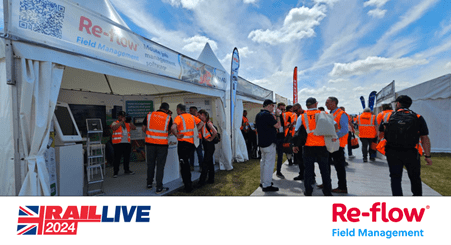The rail industry needs greater education, mentorship, and cultural change to attract young talent, say experts at Rail Live
“It is an attractive place to work, but it’s not attracting people.” This quote from CEO of Young Rail Professionals, Bonnie Price, summed up this year’s Rail Live, held at Long Marston Rail Innovation Centre from 19th to 20th June.
With all the latest tech and innovations at the event, it was easy to see why the rail industry is very appealing.
Yet, as with much of the infrastructure sector, worryingly low recruitment and retention rates remain throughout the industry.
A run down from Rail Live 2024
Day one began with a panel discussion on this topic between Bonnie Price (CEO, Young Rail Professionals), Neil Robertson (chief executive, NSAR), Sam Riley (recruitment consultant, Advance TRS and YRP External Engagement Manager), Caroline Lee, (senior social values advisor, Volker Rail), and Lorna Gibson, (training director, QTS).
Panel from LtoR: Neil Robertson, Caroline Lee, Lorna Gibson, Sam Riley, Bonnie Price © Re-Flow Field Management
They debated whether rail is an attractive industry to young people and agreed that not enough is being done to educate the new generation about career opportunities in the sector.
The panel said that young people could only identify jobs like conductor, ticket inspector, and train driver and that they weren’t aware of the numerous other careers in the industry.
They also worried that the rail industry would receive more than its fair share of bad press due to an overabundance of negative stories concerning rail strikes, ticket prices, and fines.
The impression is that rail is an expensive industry struggling with a lack of investment.
Bonnie Price went on to say that a lot of young people want to make a difference within their community, and that the rail industry should appeal to this when showing off their careers.
As Elaine Clark (chief executive officer, Rail Forum) alluded to in a later talk on creating sustainable railways, rail is an economic enabler – it has social value.
It provides good jobs for otherwise low-income workers and is clearly an essential part of the country’s infrastructure for getting working people from A to B.
More apprenticeships and mentoring are needed in the rail industry
The panel were asked for closing statements, and most called for even more mentoring and apprenticeships.
As Neil Robertson (chief executive, NSAR) said: “Apprenticeships are a well-known pathway into a career. Young people see the benefit of them. They like the practical way of learning.”
Elaine Clark focused on optics and how it was important to give young people a positive experience in the industry.
She pointed out that Rail Forum had brought a young person with them to the event to take photographs and that if that photographer had a positive experience, they might go on to promote rail as an industry to work into other people their age.
© Re-Flow Field Management
Changing the culture of rail
The panel said that changing the culture of rail would take time.
Other talks at the show covered funding, net zero, and the upcoming election.
There was a desire for long-term planning to replace short-termism. They hoped that the future would bring clearer leadership.
There were also live demonstrations from exhibitors, engineering workshops with young people, and presentations of new fuel-saving technology.
Re-flow at Rail Live
Back for a third year with an even bigger stand, the Re-flow team caught up with clients Beaver Bridges, Forestry Rail and Civils Ltd (FRC), Chevron Green Services, LB Foster Ltd, and DWG Infraco Ltd to discuss the show and discover how the companies were improving their operations having implemented Re-flow.
Re-flow catching up with LB Foster at their stand © Re-Flow Field Management
Re-flow benefits rail companies by making compliance simple. A catalogue of digital forms, with configurable fields, drop-down options, and the ability to enforce completion leads to accurate data collection and robust audit trails.
Each form can be tagged with location, time, and a digital signature, so managers can keep track of works being completed.
“We use Re-flow on a daily basis. We use it almost as an augmented calendar. We manage appointments, and we put quotes through it. We are able to download live reports. It’s been a game-changing piece of software for us,” said Zoe Loveday, sales manager Europe at LB Foster.
The software allows office staff to track operative training and qualifications to ensure the right people are working with equipment.
Automation can be incorporated into the program to alert staff when certifications are about to expire or if an operative has been scheduled to work on a job but does not have the correct requirements.
Also, current customers talk about how easy the software is to use, from apprentices to senior management.
Lily Iris Clarke, ecologist at Chevron Green Services, said: “We’ve been finding Re-flow really useful. It has everything in the one place. There’s not so many different things we need to fill out. So it’s been really user friendly.”
If you want to know where Re-flow is headed next, check out their full road map here.
Learn more about Re-flow’s award-winning field management software.
The post Re-flow Field Management empowers rail industry to meet compliance standards appeared first on Planning, Building & Construction Today.


